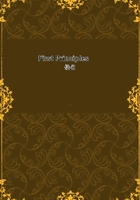
第30章
Now all this applies by change of terms to the last and highest of theseantinomies -- that between the Relative and the Non-relative. We are consciousof the Relative as existence under conditions and limits. It is impossiblethat these conditions and limits can be thought of apart from something towhich they give the form. The abstraction of these conditions and limitsis, by the hypothesis, the abstraction of them only. Consequently there mustbe a residuary consciousness of something which filled up their outlines.
And this indefinite something constitutes our consciousness of the Non-relativeor Absolute. Impossible though it is to give to this consciousness any qualitativeor quantitative expression whatever, it is not the less certain that it remainswith us as a positive and indestructible element of thought.
More manifest still will this truth become when it is observed that ourconception of the Relative itself disappears' if our consciousness of theAbsolute is a pure negation. It is admitted, or rather it is contended, bythe writers I have quoted above, that contradictories can be known only inrelation to each other -- that equality, for instance, is unthinkable apartfrom Inequality; and that thus the Relative can itself be conceived onlyby opposition to the Non-relative. It is also admitted, or rather contended,that the consciousness of a relation implies a consciousness of both therelated terms. If we are required to conceive the relation between the Relativeand Non-relative without being conscious of both, "we are in fact"(to quote the words of Mr. Mansel differently applied) "required tocompare that of which we are conscious with that of which we are not conscious;the comparison itself being an act of consciousness, and only possible throughthe consciousness of both its objects." What then becomes of the assertionthat "the Absolute is conceived merely by a negation of conceivability,"or as "the mere absence of the conditions under which consciousnessis possible?" If the Non-relative or Absolute, is present in thoughtonly as a mere negation, then the relation between it and the Relative becomesunthinkable, because one of the terms of the relation is absent from consciousness.
And if this relation is unthinkable, then is the Relative itself unthinkable,for want of its antithesis: whence results the disappearance of all thoughtwhatever.
Both Sir William Hamilton and Mr. Mansel do, in other places, distinctlyimply that our consciousness of the Absolute, indefinite though it is, ispositive. The very passage in which Sir William Hamilton asserts that "theabsolute is conceived merely by a negation of conceivability," itselfends with the remark that, "by a wonderful revelation we are thus, inthe very consciousness of our inability to conceive aught above the relativeand finite, inspired with a belief in the existence of something unconditionedbeyond the sphere of all comprehensible reality." The last of theseassertions practically admits that which the first denies. By the laws ofthought as Sir William Hamilton interprets them, he finds himself forcedto the conclusion that our consciousness of the Absolute is a pure negation.
He nevertheless finds that there does exist in consciousness an irresistibleconviction of the real "existence of something unconditioned."And he gets over the inconsistency by speaking of this conviction as "awonderful revelation," "a belief" with which we are "inspired:"thus apparently hinting that it is supernaturally at variance with the lawsof thought. Mr. Mansel is betrayed into a like inconsistency. When he saysthat "we are compelled, by the constitution of our minds, to believein the existence of an Absolute and Infinite Being, -- a belief which appearsforced upon us, as the complement of our consciousness of the relative andthe finite;" he clearly says by implication that this consciousnessis positive, and not negative. He tacitly admits that we are obliged to regardthe Absolute as something more than a negation -- that our consciousnessof it is not "the mere absence of the conditions under which consciousnessis possible."
The supreme importance of this question must be my apology for taxingthe reader's attention a little further, in the hope of clearing up the remainingdifficulties. The necessarily positive character of our consciousness ofthe Unconditioned, which, as we have seen, follows from an ultimate law ofthought, will be better understood on contemplating the process of thought.
One of the arguments used to prove the relativity of our knowledge, is,that we cannot conceive Space or Time as either limited or unlimited. Itis pointed out that when we imagine a limit, there simultaneously arisesthe consciousness of a space or time beyond the limit. This remoter spaceor time, though not contemplated as definite, is yet contemplated as real.
Though we do not form of it a conception proper, since we do not bring itwithin bounds, there is yet in our minds the unshaped material of a conception.
Similarly with our consciousness of Cause. We are no more able to form acircumscribed idea of Cause, than of Space or Time; and we are consequentlyobliged to think of the Cause which transcends the limits of our thoughtas positive though indefinite. As on conceiving any bounded space, therearises a nascent consciousness of space outside the bounds; so, when we thinkof any definite cause, there arises a nascent consciousness of a cause behindit; and in the one case as in the other, this nascent consciousness is insubstance like that which suggests it, though without form. The momentumof thought carries us beyond conditioned existence to unconditioned existence;and this ever persists in us as the body of a thought to which we can giveno shape.